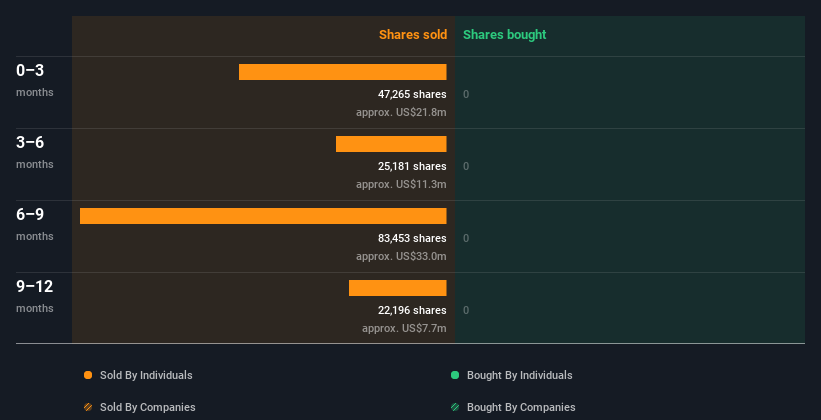
Many Gartner, Inc. (NYSE:IT) insiders ditched their stock over the past year, which may be of interest to the company's shareholders. When analyzing insider transactions, it is usually more valuable to know whether insiders are buying versus knowing if they are selling, as the latter sends an ambiguous message. However, when multiple insiders sell stock over a specific duration, shareholders should take notice as that could possibly be a red flag.
Although we don't think shareholders should simply follow insider transactions, logic dictates you should pay some attention to whether insiders are buying or selling shares.
View our latest analysis for Gartner
The Last 12 Months Of Insider Transactions At Gartner
The CEO & Director, Eugene Hall, made the biggest insider sale in the last 12 months. That single transaction was for US$8.8m worth of shares at a price of US$470 each. So what is clear is that an insider saw fit to sell at around the current price of US$439. While insider selling is a negative, to us, it is more negative if the shares are sold at a lower price. We note that this sale took place at around the current price, so it isn't a major concern, though it's hardly a good sign.
In the last year Gartner insiders didn't buy any company stock. You can see the insider transactions (by companies and individuals) over the last year depicted in the chart below. If you want to know exactly who sold, for how much, and when, simply click on the graph below!

I will like Gartner better if I see some big insider buys. While we wait, check out this free list of undervalued and small cap stocks with considerable, recent, insider buying.
Insiders At Gartner Have Sold Stock Recently
The last quarter saw substantial insider selling of Gartner shares. In total, insiders sold US$22m worth of shares in that time, and we didn't record any purchases whatsoever. This may suggest that some insiders think that the shares are not cheap.
Insider Ownership Of Gartner
Another way to test the alignment between the leaders of a company and other shareholders is to look at how many shares they own. A high insider ownership often makes company leadership more mindful of shareholder interests. Gartner insiders own about US$1.1b worth of shares (which is 3.1% of the company). Most shareholders would be happy to see this sort of insider ownership, since it suggests that management incentives are well aligned with other shareholders.
So What Does This Data Suggest About Gartner Insiders?
Insiders sold stock recently, but they haven't been buying. And there weren't any purchases to give us comfort, over the last year. The company boasts high insider ownership, but we're a little hesitant, given the history of share sales. So these insider transactions can help us build a thesis about the stock, but it's also worthwhile knowing the risks facing this company. For example - Gartner has 2 warning signs we think you should be aware of.
If you would prefer to check out another company -- one with potentially superior financials -- then do not miss this free list of interesting companies, that have HIGH return on equity and low debt.
For the purposes of this article, insiders are those individuals who report their transactions to the relevant regulatory body. We currently account for open market transactions and private dispositions of direct interests only, but not derivative transactions or indirect interests.
New: Manage All Your Stock Portfolios in One Place
We've created the ultimate portfolio companion for stock investors, and it's free.
• Connect an unlimited number of Portfolios and see your total in one currency
• Be alerted to new Warning Signs or Risks via email or mobile
• Track the Fair Value of your stocks
Have feedback on this article? Concerned about the content? Get in touch with us directly. Alternatively, email editorial-team (at) simplywallst.com.
This article by Simply Wall St is general in nature. We provide commentary based on historical data and analyst forecasts only using an unbiased methodology and our articles are not intended to be financial advice. It does not constitute a recommendation to buy or sell any stock, and does not take account of your objectives, or your financial situation. We aim to bring you long-term focused analysis driven by fundamental data. Note that our analysis may not factor in the latest price-sensitive company announcements or qualitative material. Simply Wall St has no position in any stocks mentioned.
About NYSE:IT
Gartner
Operates as a research and advisory company in the United States, Canada, Europe, the Middle East, Africa, and internationally.
Questionable track record with imperfect balance sheet.


